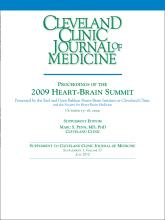ABSTRACT
The nervous system and cardiovascular system have long been known to interact. Only more recently, however, have the mechanisms driving this interaction become more clearly understood. Although many psychological disturbances, including depression and anxiety, are known to predict poor outcomes in patients with cardiovascular disease, other neurologic disturbances, such as migraine and stroke, have been connected to poor cardiovascular outcomes as well. Although these connections were traditionally thought to be due to shared risk factors, recent research has focused on pathophysiologic mechanisms underlying these interactions, including neuroendocrine dysregulation, genetic predisposition, and vascular dysfunction.
- © 2010 The Cleveland Clinic Foundation. All Rights Reserved.






